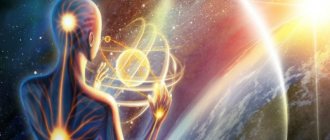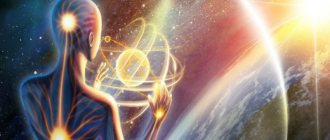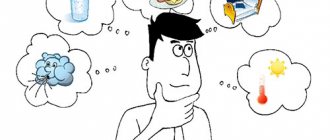Need for cognition
The tendency for cognitive activity is inherent in man by nature. One of the distinctive abilities of man, which sets him apart from the animal world, is the ability to ask questions and seek answers to them. The ability to ask complex, deep questions indicates a developed intellectual personality. Thanks to cognitive activity, an individual improves, develops, and achieves desired goals. In addition to learning about the world around us, a person gets to know himself; this process begins from the first years of life.
Cognition begins with the perception of the surrounding space, into which the baby is immersed from the moment of birth in this world. The baby tastes different objects: toys, his own clothes, everything that comes to hand. Growing up, he begins to comprehend the world through thinking, comparing and contrasting different information, observations, and facts.
The need for knowledge inherent in humans can be explained by the following reasons:
- Presence of consciousness.
- Innate curiosity.
- The pursuit of truth.
- Tendency to creative activity (interrelated with cognition).
- The desire to improve one's own life and the life of the entire society.
- The desire to anticipate and overcome unforeseen difficulties, for example, natural disasters.
Understanding the world around us is a continuous process; it does not stop after graduating from school, university, or retirement. As long as a person is alive, he will strive to comprehend the secrets and laws of the universe, the surrounding space, and himself.
Definition
Spiritual needs include the desire for self-realization, the desire to express one’s views, ideas, preferences through creative activity. This type of aspiration is due to the need for self-knowledge, awareness of the meaning of existence. Spiritual satisfaction is the ability to experience positive emotions, pleasant sensations, joy, happiness from accomplished actions, from work and creative activity.
Read also: How to make a stud gun with your own hands?
Spiritual needs are a form of human aspirations that are characterized by the impossibility of absolute saturation, which determines their limitlessness. They are potentially inexhaustible; they have no limits to growth. The only limitation is the physical and mental state of the individual, his strength and desire to continue to participate in the accumulation and consumption of spiritual values.
Spiritual values in social science represent the highest human needs; none of the other needs (biological, material) is capable of leveling out the need for the development of moral and aesthetic qualities. Satisfaction of reasonable needs leads to a state of peace and mental comfort, which cannot be achieved solely by physical saturation or material goods.
According to the classification of American psychologist Abraham Maslow, spirituality is at the 3rd most important level after physiological (air, water, food) and social (the desire to unite in groups, socialization) needs. Spiritual ones are considered ideal, high needs that arise after satisfying instinctive, lower needs. If there is a need to engage in creativity, to become involved in art, it means that the problem of primary needs has been partially or completely solved.
According to Maslow, an obstacle to the harmonious development of personal spirituality is the dissatisfaction of lower needs. However, history knows examples of the creation of masterpieces of art by creative figures who constantly lacked food and material goods. Spiritual needs are a state of consciousness that reflects the individual’s motivation for creativity and the creative process, which ultimately leads to the creation of cultural values. Spiritual values embody the feelings and intellectual potential of people.
In social science, needs are considered as a feeling of insufficiency, a lack of something in a person’s life; taking into account the nature of needs, their types are distinguished. When an individual is deprived of the ability to satisfy needs, negative emotions arise. As needs are satisfied, the emotional background changes to positive. When needs are satisfied, new aspirations usually arise due to intellectual and personal growth.
Types and ways of knowing
There are many methods and ways of obtaining knowledge about the world around us. Depending on the predominance of a person’s sensory or mental activity, two types of knowledge are distinguished: sensory and rational. Sensory cognition is based on the activity of the senses, rational cognition is based on thinking.
The following forms of cognition are also distinguished:
- Everyday (everyday) . A person gains knowledge based on his life experience. He observes the people around him, situations, phenomena that he encounters every day throughout his life. Based on this experience, a person forms his idea of the world and society; it is not always true, and is often erroneous.
Example. Marya Ivanovna, a high school mathematics teacher, believes that all students cheat. She formed this opinion thanks to her rich life experience, having worked at school for more than 10 years. But, in reality, her conclusions are erroneous and exaggerated, because there are guys who complete all the tasks on their own.
- Scientific knowledge . It is carried out in the process of a targeted search for objective knowledge that can be proven in theory and in practice. Methods of scientific knowledge: comparison, observation, experiment, generalization, analysis. The results of scientific knowledge are theorems, hypotheses, scientific facts, discoveries, and theories. If you open any school textbook, most of the information contained in it is the result of long-term scientific knowledge.
- Religious knowledge is belief in divine and demonic forces: God, angels, the Devil, devils, the existence of heaven and hell. It can be based on belief in one single God, or many Gods. Religious knowledge also includes beliefs in mystical powers and the supernatural.
- Artistic knowledge is the perception of the world based on ideas about beauty. Cognition is carried out through artistic images and means of art.
- Social cognition is a continuous process of acquiring knowledge about society as a whole, individual social groups, and people in society.
- Philosophical knowledge is based on interest in the search for truth, comprehension of man’s place in the surrounding world, the universe. Philosophical knowledge is discussed when the questions are asked: “Who am I,” “For what purpose was I born,” “What is the meaning of life,” “What place do I occupy in the universe,” “Why is a person born, sick, and dead?”
What is a person capable of? (6th grade)
Every person is at least somewhat different from others and superior to them in some way. With a variety of interests, everyone can note a basic inclination towards one or another type of activity, a task that he does much better than others.
Scientists convince us that there are no untalented people, untalented are those who have not been able to develop their abilities. The main companions of talent are not only curiosity, but also will, patient and long work.
Abilities can manifest themselves very early. A person has enormous abilities, so it is necessary to constantly try to develop them and direct them in the right direction.
The main thing is to correctly determine your abilities as early as possible. Vocation. Constantly develop your skills, completely dissolving in what you love. And then, after a while, the results of your work will not keep you waiting. But, for this it is necessary to have willpower, thanks to which a person will not give up his business halfway.
Finding yourself and correctly determining your place in life will help you think about the question: “In what area of activity can I reveal myself more fully?” Unfortunately, not always and not everyone is able to successfully solve this problem, but finding yourself and your business does not promise to be easy for anyone.
Sensory cognition
Sensory cognition is the first type of cognitive activity available to humans. It is carried out through the perception of the world based on the activity of the senses.
- With the help of vision, an individual perceives visual images, shapes, and distinguishes colors.
- Through touch, he perceives the surrounding space by touch.
- Thanks to the sense of smell, a person can distinguish more than 10,000 different odors.
- Hearing is one of the main senses in the process of cognition; with its help, not only sounds from the surrounding world are perceived, but also knowledge is disseminated.
- Special receptors located on the tongue allow a person to feel 4 basic tastes: bitter, sour, sweet, salty.
Thus, thanks to the activity of all senses, a holistic idea of an object, an object, a living being, or a phenomenon is formed. Sensory cognition is available to all living beings, but has a number of disadvantages:
- The activity of the senses is limited, especially in humans. For example, a dog has a stronger sense of smell, an eagle has vision, an elephant has hearing, and an echidna has a stronger sense of touch.
- Often sensory knowledge excludes logic.
- Based on the activity of the senses, the individual is drawn into emotions: beautiful images cause admiration, an unpleasant smell causes disgust, a sharp sound causes fear.
According to the degree of knowledge of the surrounding space, it is customary to distinguish the following types of sensory knowledge:
- 1st view - sensation . It represents a separate characteristic of an object, obtained through the activity of one of the sense organs.
Example. Nastya smelled hot bread while walking down the street; it was brought by the wind from the bakery where bread was being baked. Petya saw a shelf with oranges in the store window, but he did not have money with him to go in and buy them.
- 2nd type - perception . This is a set of sensations that creates a holistic picture, a general image of an object or phenomenon.
Example. Nastya was attracted by the delicious smell, went into the bakery and bought bread there. It was still hot, with a crispy crust, and Nastya ate half of it at once during lunch. Petya asked his mother to buy oranges at home, in the store opposite the house. They were large and bright in color, but they tasted sour and disgusting. Petya could not finish even one piece of fruit.
- 3rd view – presentation . This is the memory of an object, a subject explored earlier, thanks to the activity of the senses.
Example. Feeling the familiar smell of bread, Nastya immediately wanted to have lunch; she well remembered the crispy crust of a fresh hot loaf. Petya, having attended a friend’s name day, grimaced at the sight of oranges on the table; he immediately remembered the sour taste of the recently eaten fruit.
Rational cognition
Rational knowledge is knowledge based on logical thinking. It differs from the sensory in important characteristics:
- Availability of evidence. If the result of sensory cognition are sensations obtained from one’s own experience, then the result of rational cognition are facts that can be proven using scientific methods.
- The systematic nature of the knowledge gained . Knowledge is not isolated from each other, it is interconnected into a system of concepts and theories, forming separate sciences.
Example. History is a science based on rational knowledge. All knowledge obtained with its help is systematized and complements each other.
- The presence of a conceptual apparatus . Thanks to rational knowledge, concepts and definitions are created that can be used in the future.
Methods of rational cognition are:
- logical method (the use of logical thinking in knowing something);
- synthesis (connection of individual parts, data into a single whole);
- observation;
- measurement;
- comparison (determining differences, similarities);
All existing sciences and teachings were created on the basis of rational knowledge.
Ways to improve
As long as a person feels that there are a lot of closets with skeletons in his soul, he will not be able to enjoy even the most luxurious life in material terms. The need for self-knowledge is an ideal need, the satisfaction of which ensures peace and a positive state of mind.
It is a well-known fact in psychology: a person’s moral state is closely related to his self-esteem. Every person wants to feel special, unique, capable of doing what others cannot. This is not narcissism or bragging, but a normal necessity when it does not go beyond adequate limits.
Ways to find information
In modern times, information search has become one of the ways to understand the world around us. A wide variety of media greatly increases a person’s cognitive capabilities. Thus, cognition is carried out through:
- printed publications (newspapers, books, magazines);
- Internet;
- television;
- radio broadcasting;
Using the Internet you can very quickly and easily find almost any information, but it is not always reliable. Therefore, when choosing ways to search for information, you need to be careful and check data in different sources.
Example. In 2012, many articles were published on the Internet that foreshadowed the end of the world. Some talked about an asteroid falling to Earth, others about global warming and flooding of the land surface. But this could be easily verified by finding research by different scientists about upcoming natural disasters and comparing their results with each other.
Self-knowledge
From an early age, a person observes his appearance, evaluates his activities, and compares himself with others. Every year he learns something new about himself: abilities, character traits, and personality traits manifest themselves. Self-knowledge of a person is not a quick, gradual process. By recognizing one's strengths and weaknesses, a person can improve and develop.
Self-knowledge consists of several levels:
- Self-recognition. At the age of 1-1.5 years, the child begins to recognize himself in the mirror and understand that his reflection is there.
- Introspection. The individual observes his actions, thoughts, and actions.
- Introspection. A person is aware of his character qualities, characteristics, evaluates them, and compares them with moral standards. He compares his actions and the results to which they led.
- Self-esteem. A person develops a stable idea of himself as an individual. Self-esteem can be objective, suspended or underestimated.
In addition, self-knowledge can be directed by a person to his own mental, creative or physical abilities. A separate type is spiritual self-knowledge, in this case a person is interested in the nature of his soul.
Signs
To distinguish between material, spiritual and social needs, you need to understand their nature. Material needs are interconnected with ensuring material existence. Without material wealth, it is impossible to imagine the full life of a modern person. Spiritual benefits are interconnected with the desire for creativity, communication, and love.
Social and spiritual needs are closely related. Social needs arise in the process of an individual’s life within society. Social needs form the basis of motivation for work and other activities and participate in the formation of behavioral models. In the sphere of correlation of spiritual and social needs, self-realization and self-affirmation of the individual are distinguished. Signs of spiritual ideal needs in comparison with material needs:
- Formation in consciousness.
- Relative degree of need (for example, in comparison with physiological needs - the need for air, water, food, clothing, shelter).
- A wide choice of means of achievement, ways of satisfaction.
- Satisfying spiritual needs usually only involves spending time.
- Unselfish connection between object and subject.
- The process of satisfying needs is not limited by boundaries.
Unmet physiological needs will lead to the physical death of the individual. The inability to satisfy spiritual needs affects the psychological state of the individual, leads to social maladjustment, and a decrease in the quality of life. For example, being unemployed is associated with a loss of confidence in oneself and one's future.
The rich inner world of man
The inner world of a person is his desires, goals, beliefs, worldview, ideas about himself and other people, values. You can notice your appearance immediately and appreciate its attractiveness, but with the inner world things are more complicated. At first glance it is invisible, but over time it manifests itself in a person’s communication and actions.
It often happens that an outwardly unattractive person still evokes sympathy due to his inner qualities. Conversely, a beautiful person quickly causes disappointment if he behaves stupidly, impudently, and selfishly. So the inner world and appearance, actions - form a single whole, making up a general idea of \u200b\u200ba person.











